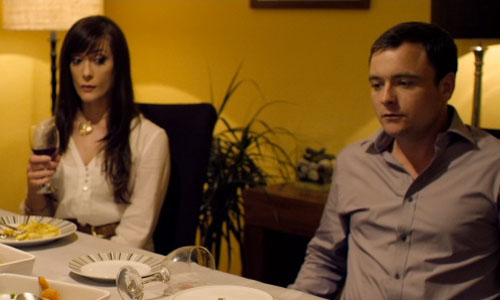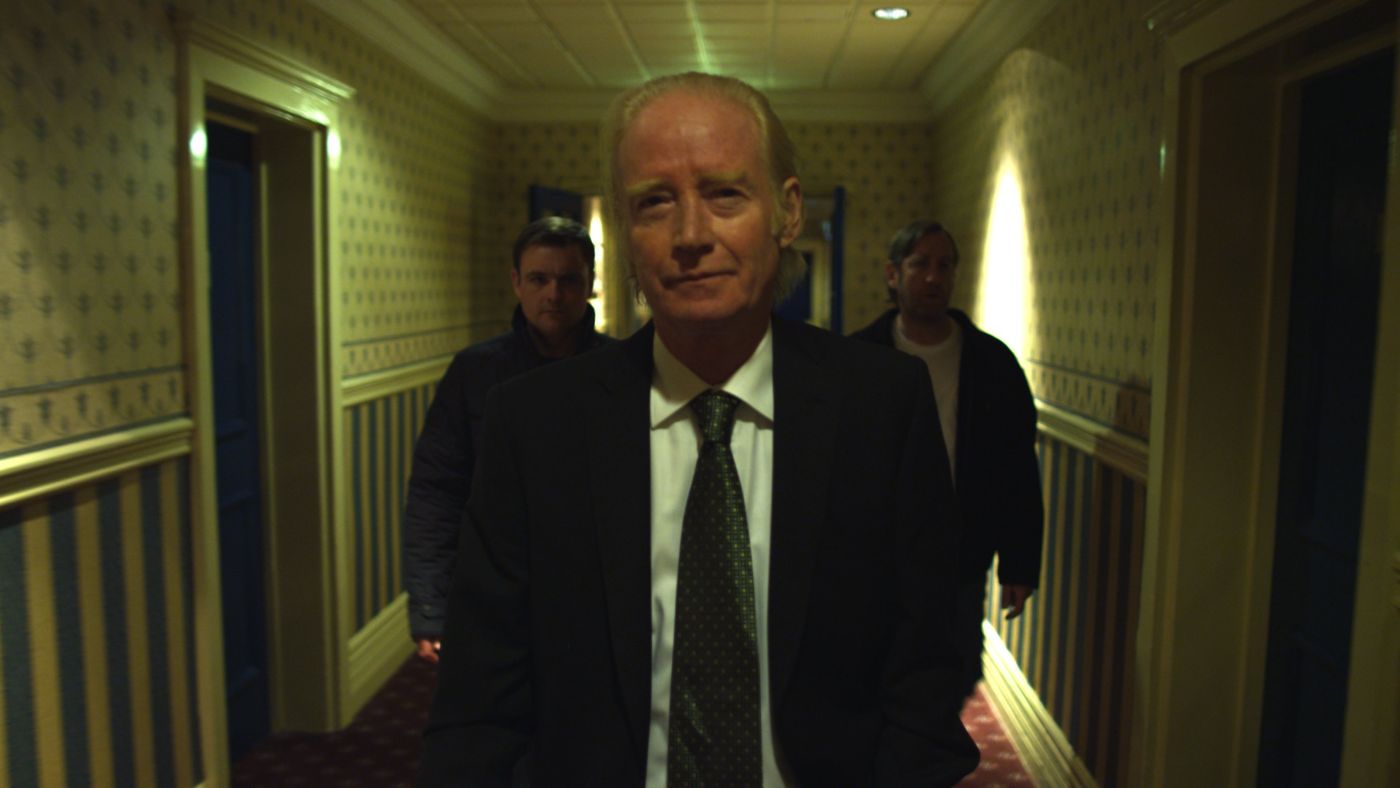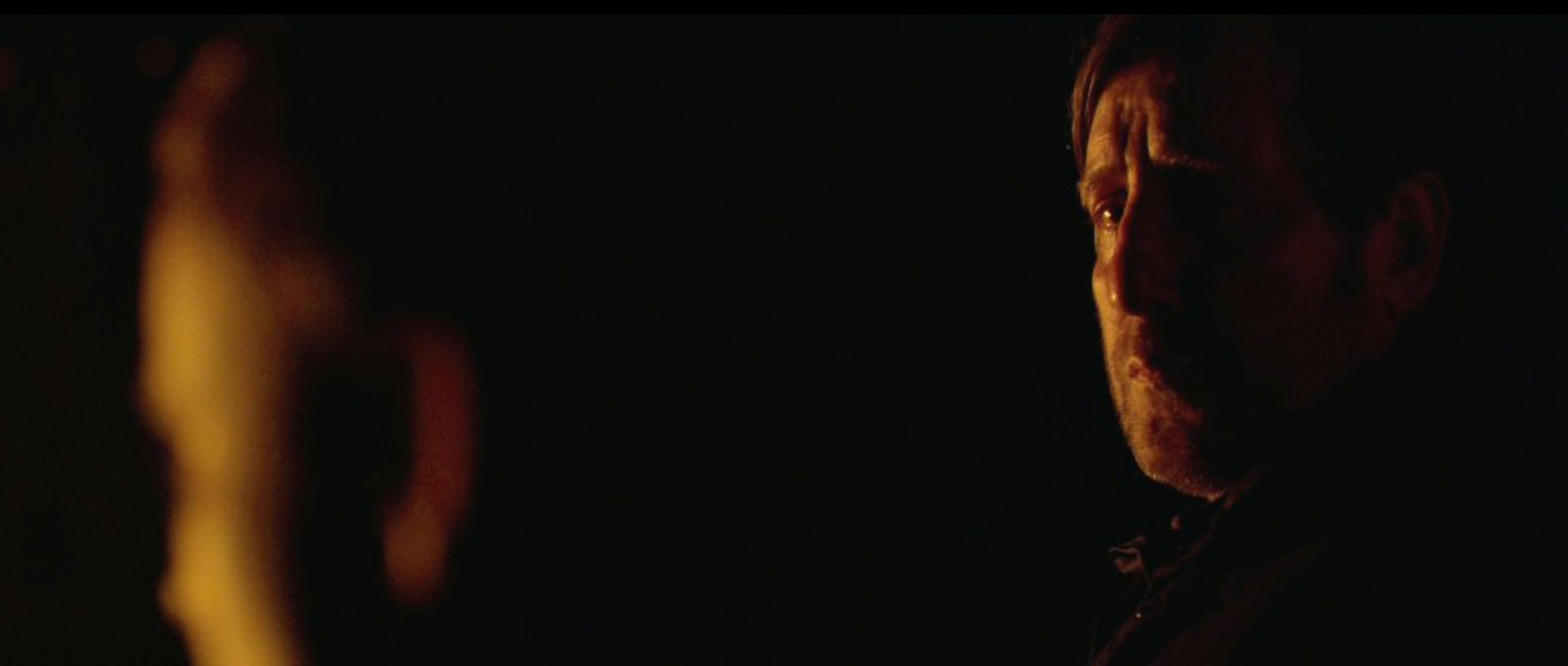Released just over five years ago, to decidedly mixed reviews, Ben Wheatley’s inscrutable Kill List now plays like a disjointed summary of our times.
Wheatley‘s more recent J.G. Ballard adaptation High-Rise might seem the more of-the-moment production, with its Cronenbergian fixations and bonkers class-consciousness. But there’s something so profoundly 1981 about that film’s assumptions. In Kill List, Wheatley’s jagged post-punk flavor — all visual conspiracy and genre-mashup; red herring, unstable reference, and post-facto internet speculation — seems a reckoning with the world we’ve made. If Wheatley ended the film with a title card, all block text like the ones he enjoys here, simply reading Covfefe, it wouldn’t be entirely inappropriate.
So what is Kill List? It’s a social-realist noir horror freakout. It’s the story of a scarred, alienated combat vet trying, and failing, to provide for his wife and son, while also being courted by a demonic force that can’t be properly understood — not by him, not by us. And, if that weren’t enough, it’s also a love triangle and a meditation on evil.

We are almost immediately thrown into a kitchen-sink domestic drama as Kill List starts, but first we gather some information. Jay (Neil Maskell) is out of work and his back hurts. (He misses his Jacuzzi, in particular.) His Swedish wife Shel (MyAnna Buring) isn’t having any of this — she needs him to step up.
Almost immediately, the couple, and their young child Sam, entertain guests, one of whom is a former coworker of Jay’s. Gal (Michael Smiley) and his apparent girlfriend Fiona (Emma Fryer) try to make the best of an increasingly tortured dinner, smoothing over the housebound discord, but tablecloths are inevitably ripped away, glasses are shattered, and the hosts move to another room to shout. We’re in a Cassavetes film, with hints of something noirish and doomed under the surface.
It doesn’t stay there for long.
Wheatley’s long takes at the dinner table will increasingly contrast with frantic editing. We’re never on sure feet regarding the characters, their attitudes, or their relations. Quick cuts from angry arguments morph into tender moments. There’s a sense that this is simply how we live — in fragmentary ways, easily jarred — and another sense that this is how Jay views the world, as though he’s editing the vision presented.

Turns out they’re hitmen, recovering from some sort of botched job in Kiev (a MacGuffin that animates the narrative). Kill List segues into a “one last job” plucked straight from the annals of noir, but we’re left to wonder why, exactly. Jay is definitely in financial straits, like any number of noir protagonists before him, and he definitely seems to want the hot tub fixed, but something seems off.
The edgy Jay we met at the film’s start has become icy and calm once he agrees to take the job, and Gal actually becomes the more worrisome sort. As it turns out, the killings may be retribution for heinous acts on the part of those listed. Maybe the two are heroes.
Kill List derives much of its power from looking and feeling like a horror movie without actually playing by horror rules. The early social-realist scenes blend into the murderous procedural — hell, even the Unsuspecting Wife trope gets inverted, waving a suburban goodbye, with their child in tow, to her husband as he drives off in the morning, to go kill people. Everyone knows what these two are up to.
 But Wheatley conjures a kind of road-trip brotherhood at the same time out of role-reversal. Jay is not merely unstable, but perhaps extremely dangerous; Gal, who waltzes into the frame as a plot device determined to suck his friend back into danger, is a God-fearing kind of soul, seemingly tortured by the past even as he gets the job done. He’s also clearly worried about his friend.
But Wheatley conjures a kind of road-trip brotherhood at the same time out of role-reversal. Jay is not merely unstable, but perhaps extremely dangerous; Gal, who waltzes into the frame as a plot device determined to suck his friend back into danger, is a God-fearing kind of soul, seemingly tortured by the past even as he gets the job done. He’s also clearly worried about his friend.
The narrative choices, and Wheatley’s insistence on ambiguity, make Kill List a strange little cypher. By the time people are scrawling esoteric symbols on the backs of mirrors and each of the murder victims sincerely thank Jay for his efforts, it’s pretty clear we’ve had the rug pulled out. Kill List threatens to become a horror movie from its opening moments; in its final third, it makes good on the promise.
 Throughout the film, Wheatley is obsessed with reflections and refractions, never more so than with the two leading female
Throughout the film, Wheatley is obsessed with reflections and refractions, never more so than with the two leading female  characters. (In a surprise to no one, internet sleuthing reveals they are the most implicated in the final reveal.) Instead, those moments are visual cues, linked in tenuous ways to the narrative. Kill List can be read easily as a cult saga, a hitman story, a revenge narrative, a domestic abuse allegory, a PTSD fantasia … but it can be read in other ways, too. It doesn’t want to be resolved into a coherent whole, a point its interpreters seem to miss.
characters. (In a surprise to no one, internet sleuthing reveals they are the most implicated in the final reveal.) Instead, those moments are visual cues, linked in tenuous ways to the narrative. Kill List can be read easily as a cult saga, a hitman story, a revenge narrative, a domestic abuse allegory, a PTSD fantasia … but it can be read in other ways, too. It doesn’t want to be resolved into a coherent whole, a point its interpreters seem to miss.
So the impossible question: what, then, is Kill List about? Its clear-eyed undermining of traditional narrative structure seems to focus us on the character of Jay — why he behaves like he does, with such latent violence and simmering glee at the prospect. It looks a lot like the problem of evil.
In a great essay about the Coen Brothers, Morgan Meis found in their work a connection to the writings of St. Augustine:
Augustine finally came to understand, paradoxical though it may sound, that evil does not exist because “existence” names all that is created and everything created is good. He observes that there are separate parts of God’s creation, which we think of as evil because they are at variance with other things.
In Kill List, this seems to play out from moment to moment. Whatever happened during the war, whatever happened in Kiev, Jay is out of sequence. His good intentions — maybe — are out of place. He is a discordant note, a set of noble desires rubbing up in the wrong way, and producing evil.
Perhaps he wants it, or perhaps he is, as a central character suggests, a cog in the machine. The Pynchonian echoes don’t seem accidental. Either way, we end up in a dangerous place.
This post is aimed squarely at Patreon subscriber Trevor Collins, who insisted I review this film with sufficient tenacity that I had to finally do it. (Thanks, Trevor!) If you would also like to harangue me into reviewing some particular movie, I will absolutely do it and do it on the cheap.

![The social-realist noir horror [insert adjective here] freakout of Kill List](https://ludditerobot.com/wp-content/uploads/2017/05/kill-list-1280.jpg)